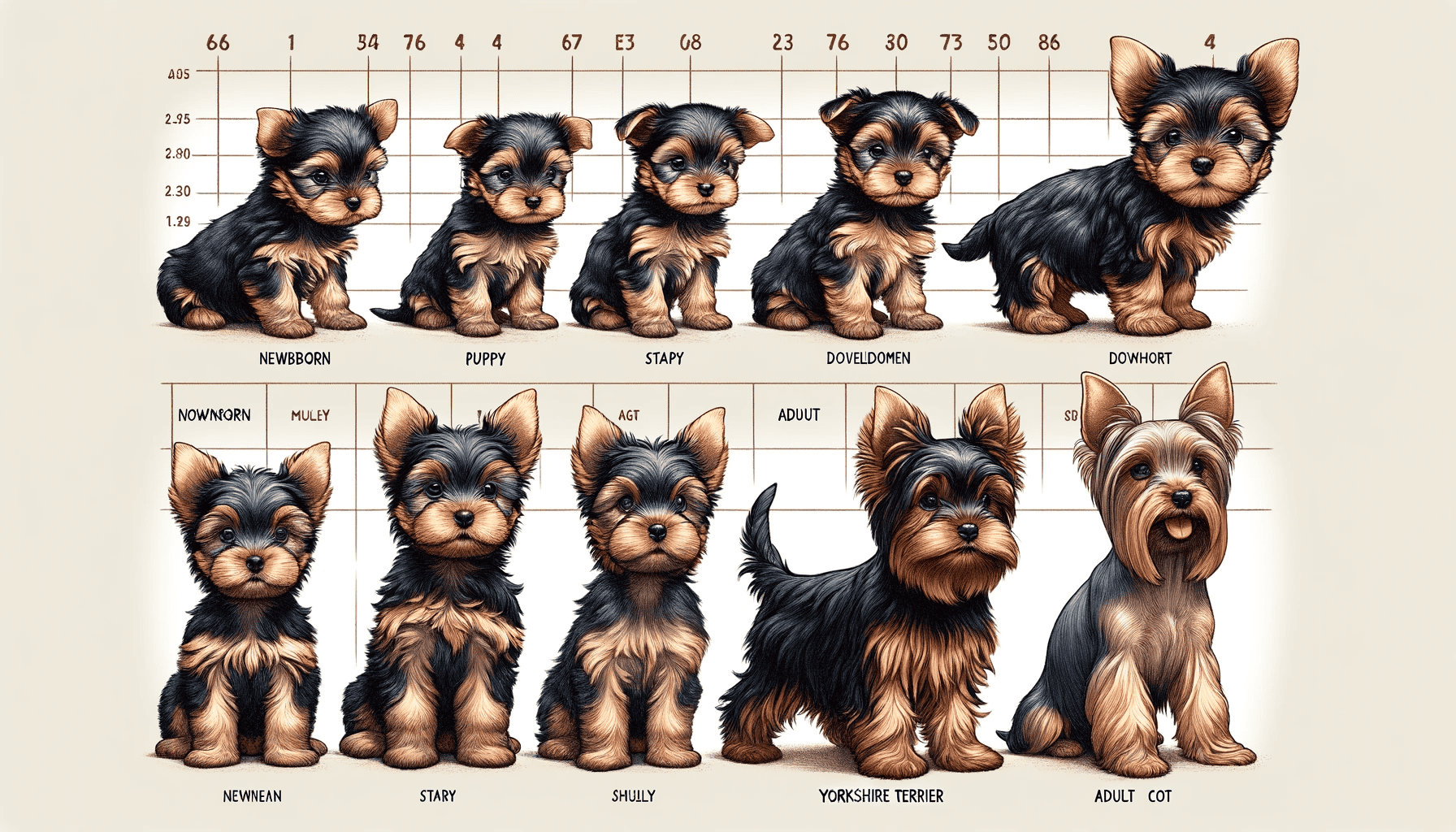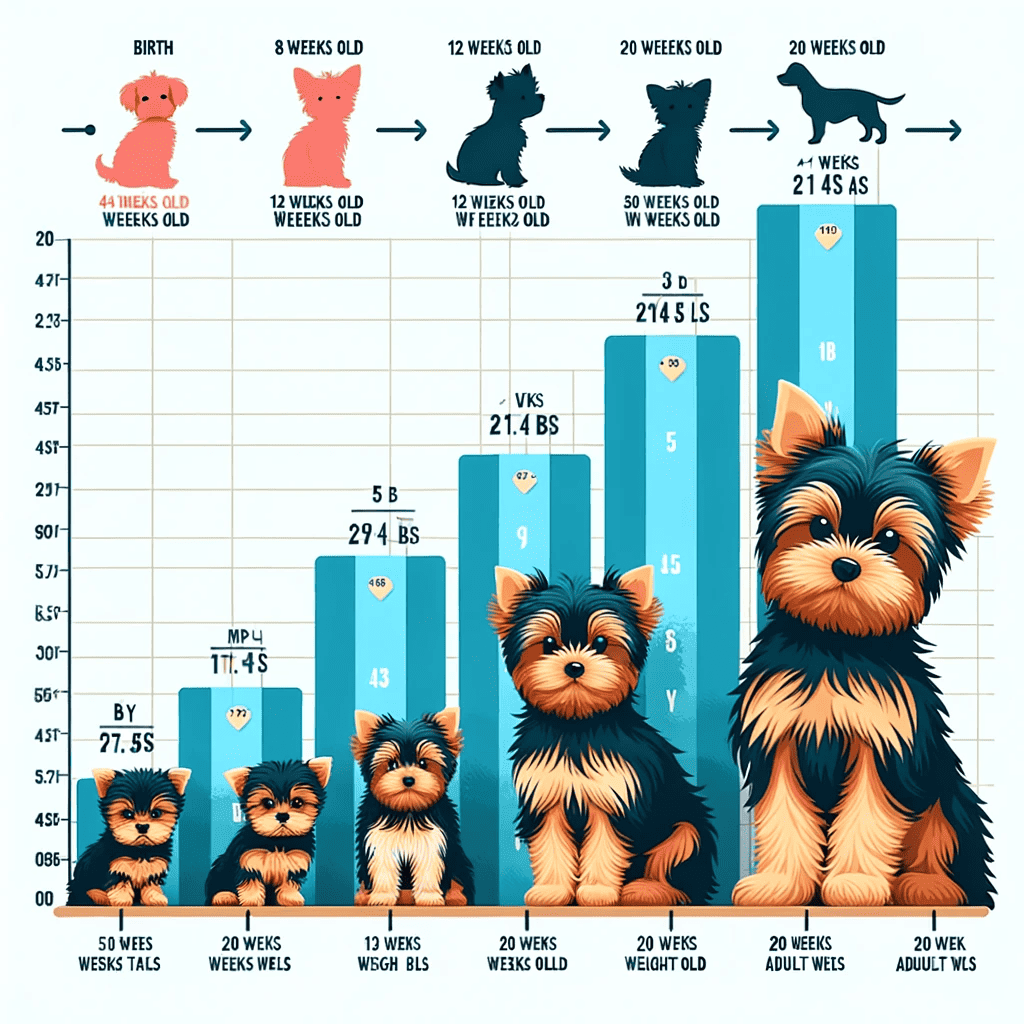Blog
Yorkie Growth Chart Through Life Stages: Things To Know

So you’ve just brought home an adorable new Yorkie puppy. Congratulations! Yorkies are wonderful companions. Now, the fun really begins as you get to watch your tiny furball grow into an adult dog. Yorkie growth happens quickly,. Therefore, you’ll want to understand the key milestones and make sure your pup is developing properly. Monitoring your Yorkie growth chart will also help you provide the best care for your pooch at each stage.
Whether your Yorkie is a newborn, adolescent, or fully grown, this guide will walk you through what to expect. You’ll learn the typical size, weight in lbs, teeth development, coat changes, and other physical milestones for Yorkies at different ages. You’ll also discover how factors like genetics, diet, health, and environment can influence your Yorkie’s growth. Fasten your seatbelt – the journey from puppy to adult Yorkie in 12 short months is going to be an exciting ride!

Yorkie Growth Chart From Puppyhood To Adulthood
As a new Yorkie owner, understanding their growth and development over the first year is important. Yorkies go through several distinct stages as they mature into adult dogs. Monitoring your Yorkie’s progress and providing proper care at each stage will help ensure they develop into a happy, healthy companion.
Yorkies grow quickly during the first few months of life. On average, most Yorkies reach their full adult size between 9 to 12 months. However, there can be slight variations depending on genetics, diet, and exercise. Below is a quick summary of the Yorkie growth stages:
| Age | Weight Range | Growth Stage |
|---|---|---|
| 0 – 2 Weeks | 2 – 5 ounces | Newborn |
| 2 – 8 Weeks | 6 – 17 ounces | Neonatal Phase |
| 8 – 16 Weeks | 1 – 2.5 pounds | Early Puppyhood (Weaning) |
| 16 Weeks – 6 Months | 2.5 – 5 pounds | Late Puppyhood (Growth Spurt) |
| 6 – 12 Months | 4 – 7 pounds | Adolescence (Near Full Size) |
| 12+ Months | 4 – 7 pounds (stabilized) | Adult |
The figures above are estimates from the Yorkie growth chart calculator and provide a scale of how your Yorkie will grow across different stages of life. Let’s now explore each life stage in more detail to help you understand their developmental milestones.
Newborn Stage of a Yorkie (0-2 Weeks)
The newborn stage spans the first couple weeks of a Yorkie’s life. Yorkie puppies are blind, deaf, and dependent on their mother at birth. Puppies should stay with their mother during this stage and meet her by her smell. Breeders will handle puppies briefly each day to socialize them to human contact.
Key Characteristics:
- Eyes and ears remain closed.
- Puppies can only crawl or nudge for warmth and milk.
- Their main activity is feeding, which helps them gain weight rapidly.
This is a critical stage for ensuring that puppies receive enough nutrition from their mother. During these weeks, Yorkies go double in size, setting the pace for future growth, as reflected in the Yorkie puppy growth charts.
Neonatal Phase (2 – 8 Weeks)
The 2-8 week period is the most critical for a Yorkie puppy’s growth, with rapid physical and behavioral development. Puppies start to transition from being completely dependent on their mom to becoming more independent. This growing stage prepares them to eat solid foods and interact with their surroundings.
Growth Overview:
- Weight: 6-17 oz by 8 weeks, with weekly gains.
- Eyes and Ears: Eyes open around 2 weeks, then ears. This is the start of sensory awareness.
- Mobility: As they get more coordinated they start walking and exploring. They start socializing by playing with littermates which is important for emotional development.
- Weaning: Around 4 weeks they start to wean off nursing to soft solid foods, by 6-8 weeks they are fully weaned.
Weight gain is the key to a healthy puppy according to the Yorkie growth chart and we get to see the start of their personality too!
Early Puppyhood (8 – 16 Weeks)
Between 8 and 16 weeks, your Yorkie puppy will typically weigh 1 to 2.5 pounds, though some may be slightly smaller or larger depending on their genetics. This is a big milestone in your puppy’s life, as they begin to transition from being dependent on their littermates and mother to learning how to be independent. It’s an exciting but critical time because their immune system is still developing, making proper care and nutrition essential. During this stage, many Yorkies also find their forever homes, which means they’ll start forming strong bonds with their new families.
Growth and Development:
- Steady Weight Gain: According to the Yorkie puppy growth weight chart, weight gain remains consistent. Puppies at this stage need proper nutrition to fuel their development and stay on track with the expected growth curve.
- Solid Food Diet: Your Yorkie will now transition to solid food entirely, leaving milk behind. Their meals should be small and frequent, packed with nutrients to support their rapid growth. Owners should focus on high-quality puppy food to keep their Yorkie energetic and healthy.
- Teething Troubles: Around 12 to 16 weeks, teething kicks in, and you’ll notice your puppy chewing on everything—furniture, shoes, and even your fingers. Providing teething toys and encouraging good chewing habits can save both your belongings and your sanity!
- Training Begins: This is also the perfect time to start potty training and socialization. Yorkies are smart but can be a bit stubborn, so early training with plenty of positive reinforcement will set the foundation for good behavior in adulthood. Exposure to different people, pets, and environments during this time is essential for preventing anxiety and fear later in life.
- Regular Vet Visits: Don’t skip your veterianarian check-ups during this phase. Your vet will monitor your Yorkie’s development and compare their growth to the Yorkie terrier growth chart. This helps ensure your puppy is growing as expected and can catch any health issues early.
This stage is all about building healthy habits—both for you and your puppy. With a steady feeding schedule, training routine, and regular veterinarian care, you’re setting the stage for your Yorkie to grow into a happy, healthy adult. Expect plenty of playful moments, lots of cuddles, and some mischief along the way!

Late Puppyhood (16 Weeks – 6 Months)
During this phase, your Yorkie is well into a growth spurt, and their weight typically ranges between 2.5 to 5 pounds, though individual differences in genetics, diet, and activity levels can lead to slight variations. This period is an exciting yet challenging time for Yorkie owners because these pups are full of energy and personality.
Notable Milestones:
- Coat Development: By now, your Yorkie’s fluffy puppy coat will start transitioning to its silky adult coat, giving them that signature Yorkshire Terrier look. Regular grooming helps maintain their coat’s health and shine.
- High Energy Levels: Expect your Yorkie to be extra playful! This is the time to focus on regular exercise and mental stimulation to keep them entertained and prevent destructive behaviors. Short walks, interactive toys, and training sessions will go a long way.
- Training Challenges: Puppies around this age may test your patience by pushing boundaries. Stay consistent with training and reinforce good behaviors with treats and praise.
- Approaching Full Size: As shown on the yorkie chart growth, your pup will be close to their adult weight by the time they hit 6 months, though some may still fill out slightly over the next few months.
- Dental Health Alert: Keep an eye on their teeth, as adult teeth continue to come in. This is a good time to introduce dental chews and begin regular brushing to maintain oral hygiene.
At this stage, your Yorkie may appear fully grown, but they are still learning and developing mentally.
Adolescence (6 – 12 Months)
By the time a Yorkie reaches 6 months, they have completed most of their physical growth, with their weight falling between 4 and 7 pounds. While the major growth milestones are behind them, some Yorkies may still fill out subtly until they reach their first birthday. This stage represents a transition from playful puppyhood to adulthood, but it comes with some behavioral challenges.
Developmental Highlights:
- Adult Appearance: At this stage, your Yorkie begins to look more like an adult, with fully developed facial features and a more refined build. Their coat continues to mature, gradually taking on the silky texture Yorkies are known for.
- Teenage Stubbornness: Just like human teenagers, Yorkies might show defiant behavior around this time. They may ignore commands or push limits, testing their owners’ patience. Maintaining consistent training is essential to reinforce positive behaviors and prevent bad habits from forming.
- Spaying or Neutering: Many vets recommend spaying or neutering your Yorkie between 6 and 12 months to promote better health and prevent undesirable behaviors, such as marking or aggression. This procedure also helps reduce the risk of certain health problems later in life.
- Monitoring Growth: It’s still important to refer to a growth chart Yorkie during this phase to ensure that your pet’s development is on track. Some Yorkies may plateau early, while others might have small growth spurts before their first birthday. Providing the right balance of nutrition and exercise is key to maintaining a healthy weight and supporting your Yorkie’s long-term wellbeing.
During this stage, it’s all about guiding your Yorkie toward responsible adulthood while enjoying their playful energy. With patience, love, and regular care, you’ll see them blossom into a well-adjusted companion.
Adulthood (12 Months and Beyond)
Once your Yorkie reaches 12 months, they are officially considered adults. At this point, their weight stabilizes between 4 and 7 pounds, though some may be a little heavier depending on their genetics or diet. While their physical growth is complete, adult Yorkies still require regular care to stay healthy and happy throughout their lives.
Adulthood Characteristics:
- Coat Maintenance: By now, your Yorkie’s coat has reached its full length, giving them their signature long, silky hair. Regular grooming is essential to prevent matting and maintain the coat’s health. Many owners opt for professional grooming every 4 to 6 weeks, especially if they keep their Yorkie’s hair long.
- Energy Levels: Although Yorkies remain energetic, they become a bit more predictable in their behavior as adults. They may still love daily walks and play sessions, but they’ll also enjoy spending time cuddling with their owners.
- Building Bonds: Yorkies thrive on routine and develop strong emotional bonds with their families. They are known for being affectionate and often grow very attached to their humans, following them around the house and seeking attention.
- Weight Management: According to the growth chart for Yorkies, most standard adult Yorkies maintain their size throughout adulthood. However, owners must keep a close eye on their pet’s weight to prevent obesity, which is a common issue in small breeds. Too many treats or insufficient exercise can lead to weight gain, which may cause joint issues or other health problems. Regular vet check-ups and portion control will help keep your Yorkie in good shape.
Although your Yorkie is now fully grown, they’ll still have the heart and playfulness of a puppy. With proper grooming, exercise, and lots of love, they’ll remain a loyal and lively companion for many years to come.
Yorkie Growth Chart Month-by-Month: Feeding, Health & Care
Since every phase of your Yorkie’s life is followed by different milestones, we decided to provide you with the following tips:
Yorkie Growth Chart: 1-3 Months
Yorkie puppies at this age are tiny, often weighing just 1 to 3 pounds. They need to eat several small meals a day of puppy food to support their growth. Take your Yorkie to the vet for their initial vaccinations and deworming. House training and basic obedience training should start right away. Expect lots of sleep, play, and bonding with their new family during these early months. Since they’ll be very small and tiny, it’s not recommended to allow kids from your family to bother them during this stage. They need a quality sleep and a lot of rest to properly develop.
Size and Weight
Yorkie puppies typically weigh between 1 to 3 pounds at 8 weeks of age when you first bring them home. They will gain about 1/2 pound per week over the next few months. Most Yorkies will weigh between 3 to 7 pounds by 12 weeks of age. Every puppy is different, so don’t worry too much if your Yorkie is a bit smaller or larger. As long as they are active, eating well, and keeping up with milestones, they should be perfectly healthy.
Teething and Chewing in Yorkies
Around 3 to 4 weeks of age, your Yorkie’s baby teeth will start to come in. Teething can cause discomfort, so provide chew toys that can be frozen or chilled. This helps soothe their gums. Yorkie puppies also love to chew during teething, so keep shoes, wires, and anything else they could choke on out of reach. Offer appropriate chew toys instead to redirect them. During this stage, your pup will also want to investigate the world. Let them sniff, lick, and explore their environment.
Learning and Socialization of Your Yorkie
The first 3 months are a critical socialization period for Yorkie puppies. Expose your puppy to new people, sights and sounds in a positive, controlled way. Carry your puppy facing forward in your arms, praising and treating them when they remain calm. Invite friends over to gently pet and play with your puppy. Early positive socialization helps prevent behavior problems later on.
Housetraining and Crate Training
Yorkie puppies have small bladders and need to go out frequently, about once every 1-2 hours. Closely supervise your puppy indoors, and take them out right after they eat, drink or wake up. Crate train your Yorkie to aid in house training. The crate should only be big enough for them to stand up and turn around. Never leave a Yorkie puppy in a crate for more than a few hours. Housetraining a Yorkie can take 4-6 months of consistency and patience.
With proper care and nutrition, Yorkie puppies will thrive during these early months. Be sure to take your puppy for regular vet checkups and vaccinations to monitor their growth and development. The rewards of raising a well-adjusted, loving Yorkie companion will make the challenges of puppyhood well worth it!

Yorkie Growth Chart: 4-6 Months
At 4 months, a Yorkie typically weighs between 2 to 3 pounds. They’ll reach about half their adult size by 6 months, weighing 3 to 4 pounds for males and 3 to 5 pounds for females. Yorkies grow rapidly during this stage, so they’ll need high-quality puppy food to support their development. Feed them 3 small meals a day and always have fresh, clean water available.
Your Yorkie’s baby teeth will start falling out around 4 months as their adult teeth come in. Chew toys can help relieve teething pain and also discourage chewing on inappropriate objects. Brush their teeth regularly with a puppy toothpaste and toothbrush to get them accustomed to dental care from an early age.
Around 5 months, a Yorkie’s coat will start to change from soft and fluffy to silky and flowing. Daily brushing and combing are a must to prevent tangles and mats. Bathing once a month or every other month is typically sufficient. Be very gentle and use a mild puppy shampoo and conditioner.
At this stage, Yorkies can learn basic commands like ‘sit,’ ‘stay’ and ‘come.’ Use positive reinforcement training with treats, praise and play. Keep training sessions short and fun. Socialization is also important, so introduce your Yorkie to new people, pets and experiences in a gradual, positive way.
With the right nutrition, training, socialization, and veterinary care, your Yorkie will grow into a happy, healthy companion. Be patient through challenges and enjoy every moment with your adorable little fur ball!
Yorkie Growth Chart: 7-9 Months
Yorkies are almost adults at this point, weighing 7 to 10 pounds. Reduce feedings to twice a day. Yorkies go through an adolescent phase and may test boundaries, so remain patient and consistent with training. Neutering or spaying your Yorkie around 6-8 months can help calm hormonal behavior changes.
Yorkie Growth Chart: 10-12 Months
Your Yorkie reaches full maturity at 12 months. Most Yorkies will weigh between 8 to 15 pounds as adults, depending on genetics. Transition to feeding your Yorkie twice a day with high-quality adult dog food to maintain their ideal body weight. Yorkies are prone to dental issues, so start brushing your Yorkie’s teeth regularly and schedule routine vet checkups. Besides, they’re also prone to hypoglycemia. By providing mental and physical stimulation, your Yorkie will remain an energetic and lively companion for many years.
Size and Weight of Your Yorkie
Your Yorkie will likely reach their full adult height of 8-9 inches at the shoulder during this period, though they may continue gaining weight until 12-18 months. At 10 months, a male Yorkie weighs 4-6 pounds, while a female weighs 3-5 pounds. By their first birthday, males are 5-7 pounds and females are 4-6 pounds. Yorkies are considered adults at 12 months, though some continue maturing until 18 months.

Physical Changes
Your Yorkie’s baby teeth will fall out and be replaced by their permanent adult teeth during this stage. Their silky, fine coat will continue to grow in and require frequent brushing and combing to prevent matting and tangles. Yorkies remain a very active and energetic breed at this age, so continue providing plenty of exercise, play, and mental stimulation for your pup.
Training and Socialization of Your Yorkie
Continue reinforcing basic training program and commands with your Yorkie, and start introducing more advanced training. Work on leash training, crate training, and house training. Extensive socialization at this age is critical for developing a friendly, outgoing temperament. Invite friends over, share experiences, take your Yorkie on walks, arrange play dates with other dogs. In other words, expose them to new situations and environments.
Balanced Diet of Your Yorkie
Your Yorkie should continue eating high-quality puppy food formulated for small breed dogs until 12 months of age. At 10-12 months, most Yorkies do well eating two slightly larger meals a day. Measure out portions carefully and avoid leaving food out all the time to prevent obesity. Yorkies have a tendency to become overweight, which can lead to health issues.
Providing the right nutrition, training, socialization, and veterinary care during these months will set the stage for a long, healthy, and happy life with your Yorkie. While they may act like little adults at this point, they still have some maturing to do over the next several months. With patience and consistency, you’ll make it through the trials of puppyhood and be rewarded with a well-adjusted, lifelong companion.
Factors Influencing Yorkie Growth Chart Rate
Several key factors determine how quickly (or slowly) your Yorkie puppy will grow. Paying close attention to these influences and making adjustments as needed can help ensure your Yorkie reaches their full size and development potential.
The genes your Yorkie inherited from their parents are the biggest influence on their growth. Yorkies from larger parents will typically grow bigger than Yorkies from smaller parents. There’s no way to know exactly how big your Yorkie will get until they finish growing between 12 to 24 months.
Providing your Yorkie a healthy, high-quality diet tailored to their life stage is essential for proper growth. As a puppy, your Yorkie needs more calories, protein, and certain nutrients to support their rapid growth. Feed your Yorkie puppy food specifically for small breed puppies. For adults, choose a high-quality small breed adult dog food. Measure out portions carefully and avoid overfeeding.

Should I Use a Yorkie Growth Chart Calculator?
A Yorkie growth chart calculator can be an invaluable tool for pet owners trying to predict their Yorkie’s adult size. These calculators provide an estimate of how large your Yorkie will grow by tracking their weight at various milestones throughout their early development. Small breed dogs like Yorkies often have more rapid growth patterns than larger breeds, which makes monitoring weight closely during the puppy stages essential.
How Do Yorkie Growth Calculators Work?
Most Yorkie growth calculators rely on a simple formula that uses your puppy’s current weight and age to forecast their adult weight. The calculator extrapolates from their existing growth pattern and adjusts for the typical rate of development expected in Yorkies. These tools usually include milestones such as:
- 8 weeks: When puppies are ready to go to new homes.
- 12 weeks: A key growth checkpoint when weight can indicate future adult size.
- 16 weeks and beyond: A stage where the growth rate begins to slow.
Though these calculators provide useful insights, it’s important to understand that they are based on average growth patterns reflected in a Yorkie puppy growth weight chart. Variations can occur depending on factors such as the puppy’s genetics, overall health, and environmental influences.
Accuracy and Limitations
While Yorkie growth chart calculators offer a good reference point, their predictions aren’t always 100% accurate. Growth rates may vary slightly, even between puppies from the same litter. Other factors that may influence a Yorkie’s final adult size include:
- Genetics: If the puppy’s parents are on the larger or smaller end of the breed spectrum, the growth prediction may vary.
- Nutrition: High-quality food with the right balance of nutrients can promote healthy development, while malnutrition or poor diet may hinder growth.
- Illness or developmental issues: If a puppy falls behind in their growth, it might not match the predictions on the calculator.
It’s also possible for Yorkies to experience growth spurts or slow growth phases, which can temporarily throw off the calculator’s projections.

Yorkie Growth Chart: Wrapping Up
Take your Yorkie for regular veterinary checkups and care. A vet can monitor your Yorkie’s growth, ensure they stay on track, and check for any health issues. Parasites, infections or other medical problems can slow down growth if left untreated. Your vet will also provide essential vaccinations and deworming to keep your Yorkie healthy as they grow.
Giving your canine plenty of opportunities for exercise, play, and interaction will also support their growth and development. Yorkie puppies trully need mental and physical stimulation to develop properly. Provide your Yorkie with interactive dog toys to play with, take them on short walks, and spend lots of time playing, cuddling, and training your puppy every day.
Keeping a close eye on your Yorkie growth chart and making adjustments to their environment and care as needed will help ensure your playful pup reaches their full potential and lives a long, healthy life as your faithful companion.
